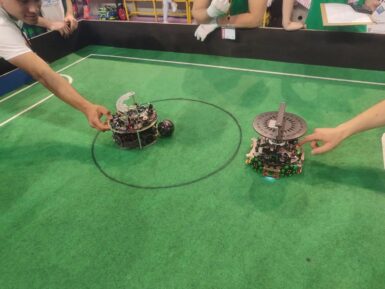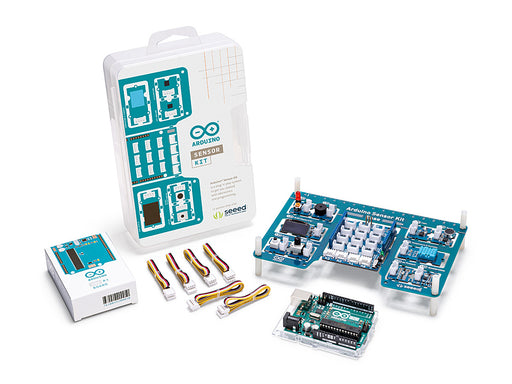
Arduino Certification Bundle: Kit & Exam
Officially certify your knowledge of Arduino in the field of programming and electronics by taking the Arduino Certification exam.
Overview
The Arduino Certification exam + kit bundle includes an Arduino Starter Kit and access to the certification exam.
Developed in consultation with interaction designers and electronic engineering professionals as well as in regards to leading technology curriculum, the Arduino Certification exam assesses skills based upon exercises comprised of practical tasks from the Arduino Starter Kit.
To obtain the certificate, you will be requested to answer 36 questions over a period of 75 minutes.
Purchasing the bundle will grant you the Arduino Starter Kit and an activation code, which can be used to unlock 1 attempt at the Arduino Certification exam.
Purchasing the exam alone costs $30, and grants 1 attempt at the Arduino Certification.
Once the code has been redeemed, you have one year to activate the exam, otherwise the code will become invalid.
The exam is available in English. Spanish, Italian, German and Chinese.
You can try the demo to have a closer look at how the exam will be.
To learn more about the certification process, download now the user guide
To learn more about the Arduino Starter Kit, click here
Tech specs
EXAM SUBJECT AREAS
You will encounter questions that test your knowledge in relation to the following 8 main categories:
- Electricity. Understanding the concepts such as resistance, voltage, power and capacitance,and able to measure and calculate them.
- Reading circuits and schematics. Understanding how electronics are represented visually, and the ability to read and analyze electronic circuits.
- Arduino IDE. Understanding the functionality of the Arduino development environment, serial communication, libraries and errors.
- Arduino Boards. Understanding the constitution and capabilities of an Arduino board and the functions of its different parts.
- Frequency and Duty cycle. Understanding the concepts of Pulse Width Modulation (PWM) and frequency, and being able to calculate duty cycle.
- Electronic components. Understanding how various electronic components such as LEDs, sensors, buttons and motors work, and how to use them in a circuit.
- Programming syntax and semantics. Understanding the building blocks of the Arduino programming language such as functions, arguments, variables and loops.
- Programming logic. Ability to program various electronic components, read, analyze and troubleshoot Arduino code.
For further questions, contact support here.
Resources for Safety and Products
Manufacturer Information
The production information includes the address and related details of the product manufacturer.
Arduino S.r.l.
Via Andrea Appiani, 25
Monza, MB, IT, 20900
https://www.arduino.cc/
Responsible Person in the EU
An EU-based economic operator who ensures the product's compliance with the required regulations.
Arduino S.r.l.
Via Andrea Appiani, 25
Monza, MB, IT, 20900
Phone: +39 0113157477
Email: support@arduino.cc
Get Inspired

Learn to set up an Arduino Nano RP2040 Connect to use MicroPython.

Team Ikaro is a vibrant group of high school students from the Pacinotti Archimede Institute in Rome, sharing a strong passion for electronics and turning heads in the world of robotics! Specializing in Soccer Lightweight games (where robot-soccer players compete to score goals on a miniature field), they clinched the first place at the Romecup 2024 and won Italy’s national Robocup in Verbania earlier this year – earning the right to compete in the world championships in Eindhoven, where they placed third in the SuperTeam competition. The brains behind the bots Utilizing the versatile Arduino Nano RP2040 Connect, the team has crafted highly efficient robots that feature ultrasound sensors, PCB boards, a camera, four motors, a solenoid kicker and omni-directional wheels, all meticulously assembled in the school’s FabLab. Mentored by professor Paolo Torda, Team Ikaro exemplifies the spirit of innovation and teamwork bringing together three talented students: Francesco D’Angelo, the team leader, focuses on system design and mechanics; Flavio Crocicchia, the software developer, ensures the robots’ brains are as sharp as possible; Lorenzo Addario specializes in camera software, making sure the robots can “see” and react swiftly on the field. Their combined efforts have led to a seamless integration of hardware and software, and established a foundation of passion and ambition for future success in their careers. Future goals After their first taste of global competition, Team Ikaro is determined to continue refining their robots, leveraging every bit of knowledge and experience they gain – whether in the classroom, lab, or live challenges. At Arduino, we are proud to sponsor such brilliant young minds and look forward to seeing what they will accomplish next!








